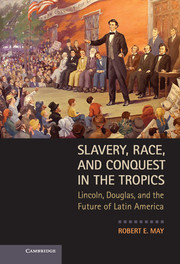Book contents
6 - Freedom in the Tropics
Published online by Cambridge University Press: 05 June 2014
Summary
In the spring of 1864, just before General Ulysses S. Grant began the campaign that crushed southern hopes for independence, a Union embarrassment off Haiti’s southwestern coast gave Confederates a rare late Civil War propaganda bonanza. A year earlier, as part of President Abraham Lincoln’s colonization program, four hundred and fifty-three African Americans had boarded the brig Ocean Ranger at Union-held Fortress Monroe on Virginia’s coast, bound for Haiti’s Île-à-Vache, or Cow Island. Nothing had gone right for the emigrants on ship or on the island. Now, a press report of their fate played into Confederate hands (Figure 6.1).
Lincoln’s embarrassment originated in the machinations of a sleazy entrepreneur named Bernard Kock, who in August 1862 signed a contract with Haiti’s government leasing Île-à-Vache for ten years. According to the deal, Kock would deliver 35.25 percent of all timber cut during his lease to Haitian authorities and he would have the work performed by imported laborers “of the African or Indian Race” who would gain Haitian citizenship upon their arrival and later get land. During September and October, Kock had lobbied the Union government to back the scheme. He submitted to Lincoln a synopsis of his contract, a proposal to colonize 5,000 African Americans on the island, and a request that Union authorities provide them with transportation there and subsistence until the immigrants could harvest a crop. On New Year’s Eve, Lincoln gave a short-lived endorsement to Kock’s proposal, changing his mind after Secretary of State William Seward received a negative report about Kock’s character and intentions. On January 6, 1863, Lincoln instructed Seward to withhold the official U.S. seal from the document. Kock then worked around the administration’s displeasure. On March 30, he transferred his contract to Wall Street financiers Paul S. Forbes and Charles K. Tuckerman, and Lincoln approved the scaled-back agreement, which provided the capitalists with $50 per emigrant in federal funds to colonize 500 former slaves.
- Type
- Chapter
- Information
- Slavery, Race, and Conquest in the TropicsLincoln, Douglas, and the Future of Latin America, pp. 230 - 276Publisher: Cambridge University PressPrint publication year: 2013



